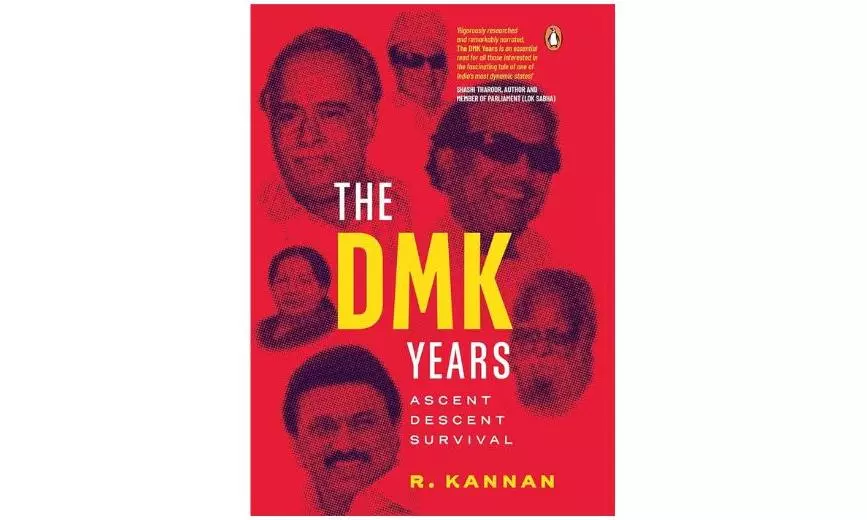Book Review | How DMK shed its fiery core

Beginning as the book does with a panegyric ode to a departed DMK leader, the fear set in that the tome running to 550 reading pages may be just another hagiographical account of political leaders who are invariably placed in a pantheon of demigods by the people. But, no, this is a very dispassionate historical account of the DMK years, warts and all, which virtually means a whole eon of time from India’s independence to the present day.
The importance of Madras, as the seat of the presidency in colonial times, and Tamil Nadu in the tempestuous days of modern Indian politics is well established with the state’s personalities having their say in national affairs. How gigantic some of them seem with the passage of time is made evident by Kannan capturing the success and failures of Annadurai, Karunanidhi, MGR and Jayalalithaa, besides touching on the influence Periyar, Rajaji and Kamaraj wielded in shaping events.
If the feeling of cynicism around Indian politics only grows as the pages roll by, blame it on how little the people’s concerns mattered to even these great leaders of people, each one having mastered the art of realpolitik after getting the endorsement of the voters. Their shifting loyalties throw an unflattering light on politics making not strange bedfellows as much as alternating allies to bed with at every turn that could be straight out of a soap opera of politics.
If Anna, who founded the DMK party to distance himself somewhat from his mentor, the atheist iconoclast socialist thinker Periyar, who was not above falling to the weakness of the flesh in marrying a woman half his age, appears the true titan, his successors may be forgiven in their having to live in far greedier times when acquisitiveness trumped everything else. Only time could have helped erase the ferociousness of thought that may have forced Periyar to say: “Identify the Brahmin house, keep a knife of fewer than six inches. When I instruct, shove the Brahmin with the knife.”
Periyar’s thoughts were only the fount of the socialist movement from which the DMK was born. The history of TN politics is majorly about Karunanidhi’s time at the helm or off it and waiting for the periodical change and how MGR founded his own party leading to a Dravidian duopoly that is intact to date despite modernity having wrought so many changes in the people and their lifestyles.
Karunanidhi’s sway over those who ruled New Delhi and his on-off closeness to Mrs Indira Gandhi and then her progeny is well brought out, so too is his greatness in thinking up schemes that would touch the disadvantaged people of India. But, as he sees his party descend from a disciplined cadre-based organisation to a family dominated outfit, he slips off the pedestal.
Throughout the book, the refrain is politicians say one thing and do another altogether and Tamil Nadu’s politicians, including the Dravidian, are all guilty of this propensity they may have justified in the name of pragmatism. Take the case of TN chief minister Stalin who said, “Senthil Balaji and his brother control Karur district through corruption, land-grabbing and looting. Everyone knows about him.” And he was the serving minister who was arrested by ED and made a minister without portfolio by the DMK when in jail. Such are the inconsistencies that crop up on every page of TN’s political history well brought out in this comprehensive narrative.
The DMK Years: Ascent, Descent, Survival
By R. Kannan
Penguin
pp. 752; Rs 1,299
